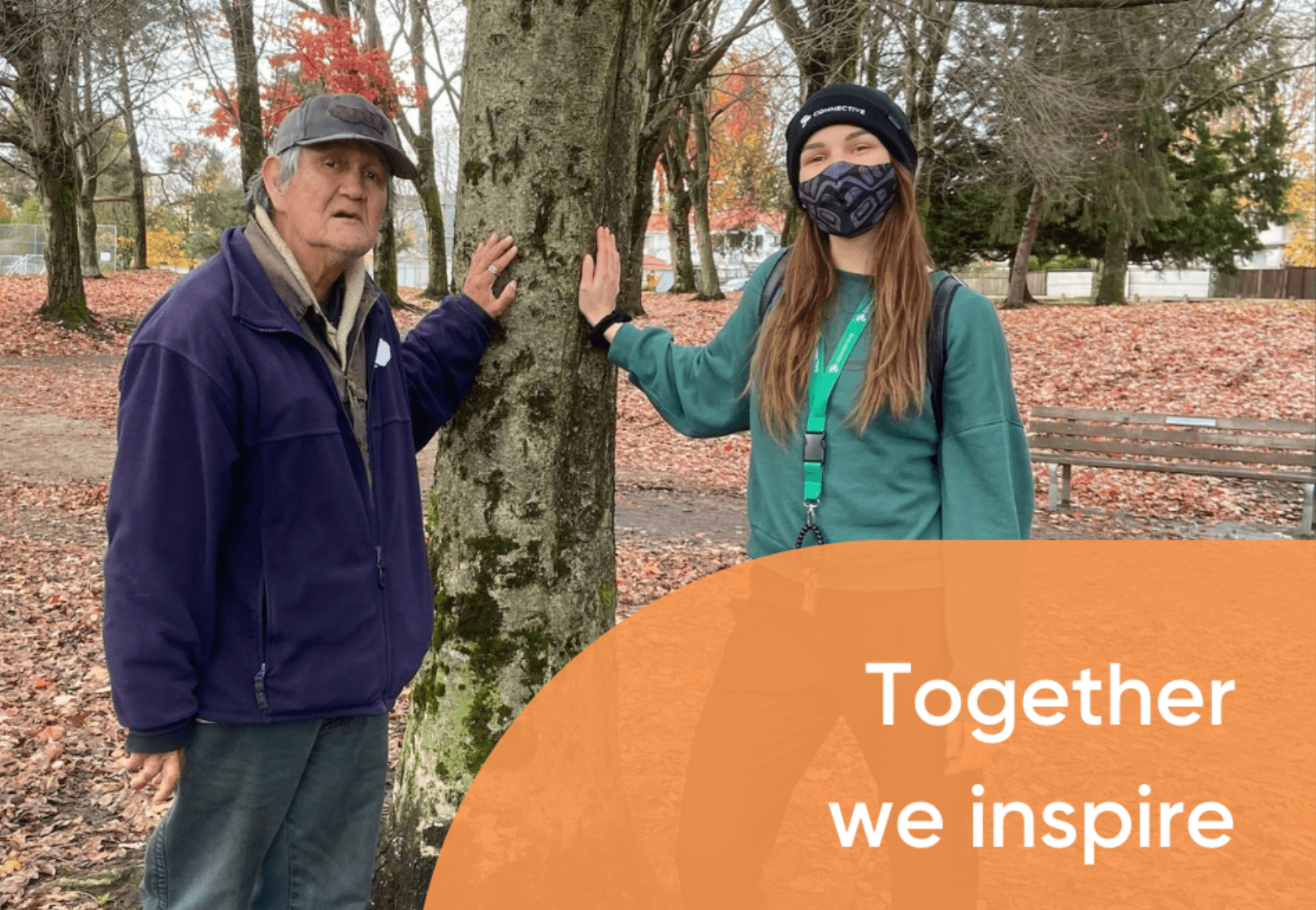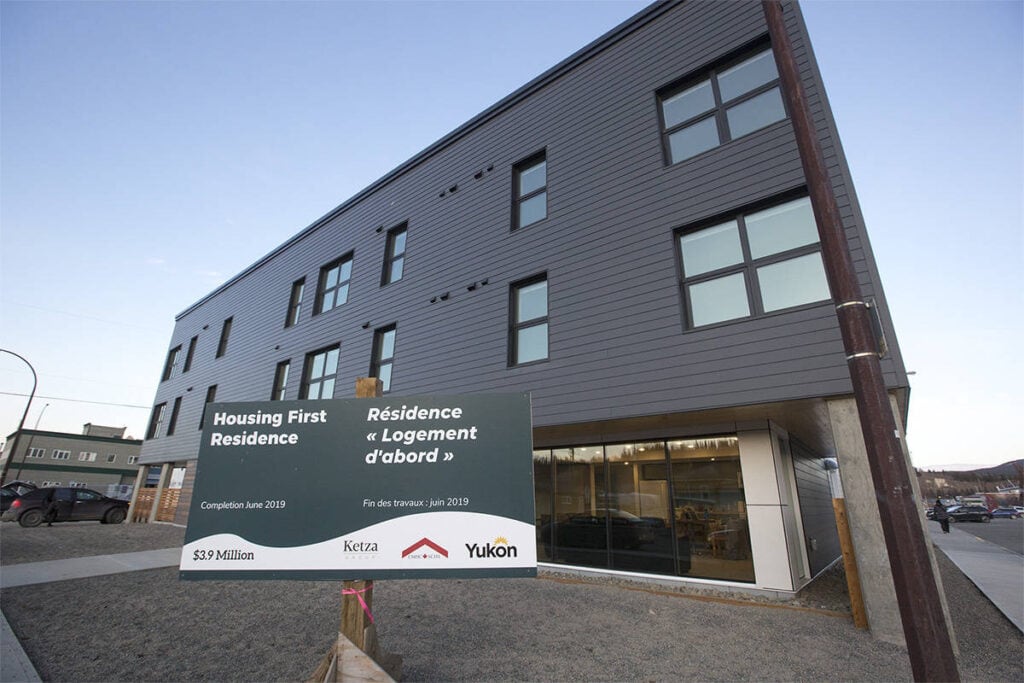Giving Tuesday 2021: Our Work in Homelessness Prevention
Our donor’s contributions help us support personal and systemic changes in marginalized communities
Nov 24 2021 | Connective

As you know, on November 1st we changed our name to better reflect who we are, what we do, and how we do it. Central to our work at Connective is addressing complex social issues that require holistic, person-centered, community-based, and solutions-focused approaches. We know that for anyone outside of our sector, this can be abstract. How do we apply these approaches and address complex social issues in practice?
In honour of Giving Tuesday next week, we wanted to answer this question to shed light on the important role donors have in our programs and services. Continue reading to see our donor’s contributions in action and how they help us support personal and systemic changes in marginalized communities.
Addressing Complex Social Issues – Our Work in Homelessness Prevention
We recognize that communities across Canada are in a housing crisis. While most Canadians have experienced or heard about the issue, it disproportionately affects individuals and families impacted by complex social issues, such as people who:
- Are unemployed or underemployed
- Experience substance abuse challenges and/or mental illness
- Are Indigenous or racialized
- Have developmental disabilities or criminal justice experience
- Are fleeing violence or domestic abuse, particularly women and gender diverse persons
- Grew up in the foster care system
- Have precarious status in Canada, such as refugee claimants and foreign nationals
Here are just some statistics that help illustrate this:
- According to the Homeless Count conducted in Whitehorse this summer, at least 151 people did not have stable housing as of this spring
- According to the 2020 Homeless Count in Metro Vancouver, 2,095 residents identified as homeless
- Approximately 136,000 adults in BC have a severe addiction and/or mental illness, and between 8,000 and 15,500 of these people are homeless
- 82% of individuals experiencing homelessness in Whitehorse self-identify as being Indigenous, and this number may be rising.
- In BC, 38% of all respondents in the 2018 Homeless Count identified as Indigenous, yet only account for 6% of BC’s total population
- People living with disabilities are twice as likely to live below the poverty line, and it’s estimated that 45% of all people experiencing homelessness in Canada are disabled or diagnosed with a mental illness
As homelessness is often hidden and hard to gather data on, these statistics don’t paint the whole picture, but they demonstrate various factors that increase the risk of homelessness.
Applying Housing First to Tackle the Issue
Given the drastic ways homelessness affects those experiencing it, as well as on our entire community, housing is essential element of our work. Whether it is in our continuum of housing, or as a wraparound support in any of our other programs, housing is at the center of what we do.
We operate more than 165 housing units across BC & Yukon in 20+ unique housing programs.
When somebody is experiencing homelessness, or is precariously housed (such as living on a friend’s couch), we connect them to housing resources, options in the community, or to housing programs such as our homelessness prevention program.
We do this with housing first principles in mind. This involves moving people experiencing homelessness rapidly from the streets or shelters into stable, long-term housing with supports. Focusing first on housing, with a commitment to addressing other challenges the individual is facing, sets people up for achieving greater independence and reduces the likelihood that they will fall back into homelessness in the future.
Our homelessness prevention program, which applies a proven approach to tackling homelessness, is made possible by donors and government funding
Contribute to our housing & homelessness prevention programming by donating to Connective
We support people with their housing needs through our housing programs, referrals to community or affordable housing, and by working collaboratively with partners, landlords, service providers in the community. Once housed, or in some cases in tandem with finding housing, we work with people to address their other needs and goals, such as those related to substance use, employment, physical or mental health, improving their access to the community around them.
Housing First is not only about housing – supportive service are an important part of the model. This includes both formal and informal supports, however acceptance of services is not a requirement for accessing or maintaining housing.
Examples of Housing First and Person-Centered Programming in Action
Regardless of whether somebody uses substances or is experiencing mental illness, we believe housing is a human right. We listen, develop relationships, and ask questions to design strategies that support people’s needs and goals. We work alongside service users as they navigate complex systems, with the goal of increasing their independence. In turn, folks can uplift themselves out of the potential cycle of homelessness or poverty.

One example of Housing First in action is our Housing First Residence. Co-delivered by the Council for Yukon First Nations in Whitehorse, Housing First provides low barrier housing for people experiencing homelessness and concurrent barriers such as mental health challenges or addictions. There are no conditions placed on residents, recognizing the complex barriers they face and the need to be person-centered in our approach.
Our staff are on-site 24/7 to provide support such as assistance to access medical care, employment services, or to serve as a source of connection. Residents also have access to cultural supports led by CYFN.
Another example of Housing First in action is in our wraparound services in Prince George. Formally, our ACES Employment program provides employability and life-skills workshops, training, certifications, and supported work experience. Recognizing the importance of stable housing on employment sustainability and success, our ACES teams support participants in their housing needs, providing outreach support, referrals, landlord mediations, and other supports to help find and maintain appropriate housing.
Cultural safety and supports are also an important part of the wraparound supports provided through the ACES program. In Prince George, over 50% of our ACES employment program participants identify as Indigenous. Our team has worked to integrate culturally relevant practices and approaches into the programming, and asked service users how programming can better meet their needs. At the beginning of each cohort, an Elder provides an opening and closing prayer, in addition to offering a smudge for those who want to participate. Standard curricula in our First Aid CPR/AED class also includes information about traditional medicines and plants around the Prince George region.
By incorporating Housing First principles and wraparound supports, our teams ensure our programs are grounded in the local community and needs of participants, and foster confidence, independence, and success.
Advocating for Systemic Change
In addition to addressing homelessness at the individual level, we work with governments, funders, ministries, Indigenous leadership, social service organizations, and others to bring about systems change. We do this through our daily interactions with these stakeholders, as well as through structured forums, such as our Leadership Gathering.
Our Leadership Gathering brings together non-profits, social sector Ministries, health authorities, Indigenous and other community organizations, and voices of lived experience to engage in critical discussions around how the coordination of services to vulnerable populations can be improved to create better outcomes. Together, we dive into key policy issues directly impacting operational services to vulnerable populations and work towards practical solutions.
Our work leading personal and systemic change cannot be complete in a day. It requires time, a willingness to try even when we don’t have the answers, and a commitment to listening to people and providing them with the support they identify needing rather than in ways we think we ought to support them. It requires collective effort. This is why our donors are so vital in our work towards safe, healthy, and inclusive communities for all. They create unrestricted opportunities for us to be creative, person-centered, and adaptive.
Donors allow us to do our work in the best ways possible.